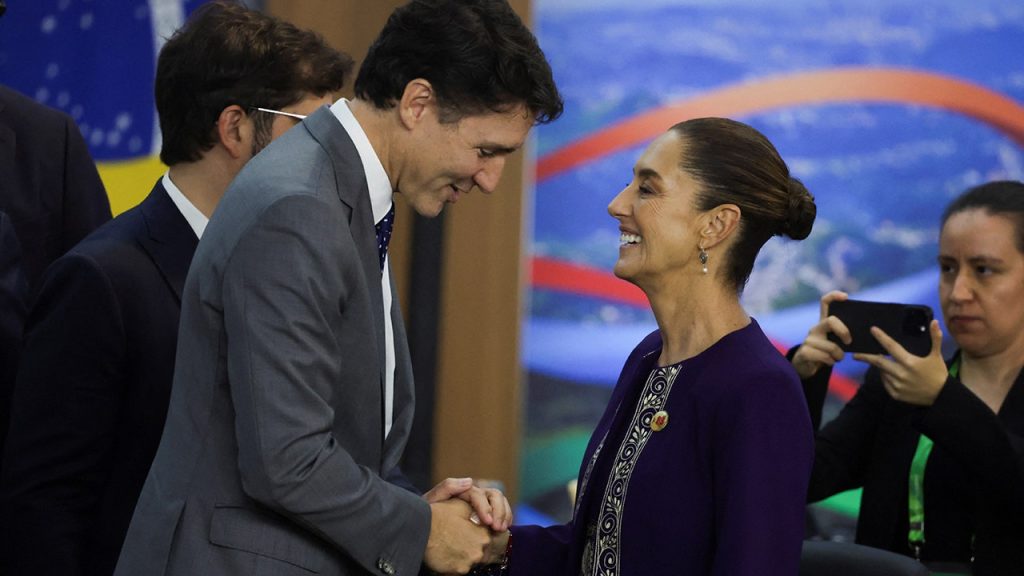In a response to recent threats from President-elect Donald Trump regarding tariffs on Canada and Mexico due to issues related to migration and drugs, Mexican President Claudia Sheinbaum asserted that Canada “could only wish they had the cultural riches Mexico has.” This remark came after Canadian Prime Minister Justin Trudeau dined with Trump at Mar-a-Lago, where border security was a key topic of discussion. Kirsten Hillman, Canada’s ambassador to the U.S., relayed that the differences between the U.S.-Mexico border and the U.S.-Canada border were made clear during the discussions. Sheinbaum emphasized the necessity of respecting Mexico, particularly from its trading partners, and pointed out that Canada also had its challenges, notably the consumption of fentanyl.
The conversation around the flow of illegal drugs and migration underscores significant disparities between the U.S. borders with Mexico and Canada. Reports indicate that U.S. customs officials seized 43 pounds of fentanyl at the Canadian border in the past fiscal year, in stark contrast to 21,100 pounds seized at the Mexican border. Additionally, the U.S. Border Patrol logged 56,530 arrests at the U.S.-Mexico border in October alone, compared to only 23,721 arrests at the Canadian border during the same period. Such statistics highlight the gravity of the drug trafficking issue in relation to Mexico, which Trump cited in his statements about border security and potential tariffs.
Trump’s assertions about the supposed infiltration of crime and drugs through both borders were made on social media, framing the situation as a national crisis that demanded immediate executive action. He proposed signing an executive order on his first day in office to impose a 25% tariff on all goods entering the U.S. from Mexico and Canada until the flow of drugs and migrants, specifically noting fentanyl and illegal immigration, is stopped. This approach reflects Trump’s longstanding hardline stance on immigration and drug enforcement, which has been a contentious topic in U.S.-Mexico relations.
In her remarks to the Associated Press, Sheinbaum also recounted a conversation she had with Trump where he expressed a willingness to enhance intelligence sharing between the two nations in their fight against drug trafficking. Sheinbaum welcomed this idea but maintained that Mexico would resist any form of direct U.S. intervention in its domestic affairs, reiterating the commitment to enforce the restrictions on U.S. law enforcement agencies in Mexico put in place by her predecessor. This highlights the ongoing tensions regarding sovereignty and law enforcement practices between the U.S. and Mexico, especially in the context of drug-related violence and trafficking.
The backdrop to this diplomatic exchange is a complex and evolving relationship between the three countries, particularly in light of trade agreements and border security measures. Sheinbaum’s comments underscore a national pride in Mexico’s cultural heritage, suggesting that tariffs and border policies should not overlook the cultural contributions and challenges faced by Mexico. The mention of cultural riches also serves as a subtle reminder to Canada and the U.S. to recognize the unique social and economic landscape of Mexico, which is often overshadowed by discussions of crime and migration.
As the situation progresses, it remains to be seen how these diplomatic tensions will influence trade relations and cooperation on border security. With Trump preparing to take office, the emphasis on protecting U.S. borders and addressing drug trafficking will likely continue to shape the agenda. Sheinbaum’s advocacy for respecting Mexico’s sovereignty and cultural identity complicates the narrative, suggesting that while cooperation is essential, it must also honor the autonomy of each nation involved, as they navigate the intricacies of crime, drugs, and migration in North America.

